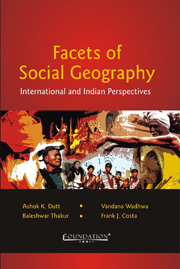Book contents
- Frontmatter
- Contents
- Foreword
- Preface
- Acknowledgements
- List of Contributors
- I Introductory Framework: Allen G. Noble's Contribution to Social Geography
- II Conceptual and Theoretical Basis of Social Geography
- III Social Geography from a Global Perspective
- IV Social Geography in the Indian Context
- 15 Socio-cultural Regions in Pre-historic and Historic India
- 16 Distinct Regional Cultural Identities of India Based on Religion and Language
- 17 Linguistic Diversity Changes in India: A Regional Analysis, 1971–2001
- 18 The Geography of Folk Art in India
- 19 Indian Dance: Classical Unity and Regional Variation
- 20 Space, Gender and Social Value: Analyzing Gender Inequalities in Relation to Space
- 21 Encountering Reservation and the Reimagining of Caste
- 22 Spatial Patterns of Crime in India
- 23 Rural Human Resource Development in India: A Spatio-Temporal Analysis
- V Indian Social Geography: City and State Context
- Index
16 - Distinct Regional Cultural Identities of India Based on Religion and Language
from IV - Social Geography in the Indian Context
Published online by Cambridge University Press: 05 June 2012
- Frontmatter
- Contents
- Foreword
- Preface
- Acknowledgements
- List of Contributors
- I Introductory Framework: Allen G. Noble's Contribution to Social Geography
- II Conceptual and Theoretical Basis of Social Geography
- III Social Geography from a Global Perspective
- IV Social Geography in the Indian Context
- 15 Socio-cultural Regions in Pre-historic and Historic India
- 16 Distinct Regional Cultural Identities of India Based on Religion and Language
- 17 Linguistic Diversity Changes in India: A Regional Analysis, 1971–2001
- 18 The Geography of Folk Art in India
- 19 Indian Dance: Classical Unity and Regional Variation
- 20 Space, Gender and Social Value: Analyzing Gender Inequalities in Relation to Space
- 21 Encountering Reservation and the Reimagining of Caste
- 22 Spatial Patterns of Crime in India
- 23 Rural Human Resource Development in India: A Spatio-Temporal Analysis
- V Indian Social Geography: City and State Context
- Index
Summary
Diverse cultures of India give rise to regional variations in both material cultures (settlement patterns, temple designs, house types, bullock carts, plow construction and way of dressing) and non-material cultures (language, criminal behavior, religion, dance forms, castes, music, god forms and perception of Indian heritage). These characteristics are so vividly pronounced regionally that one sometimes wonders if the country really possesses any harmony. There is, nonetheless, an inherent unity that has been created amidst the rich cultural heritage nurtured over 5000 years (Dutt and Noble 1982). The following aspects of culture in relation to religion and language have been examined to identify spatial implications in the country.
There exists a deep nexus between religion and culture. Since the impact of religion on culture varies spatially in accordance with its area of dominance, the phenomenon of religion as a geographic aspect is of great importance to the cultural and political geography of India. Indians take their religion seriously. For an average Indian his or her belief in religion is very deep. When the British Raj was divided into India (a secular state) and Pakistan (an Islamic nation) in 1947, there was a deep Hindu-Muslim divide, which often erupted into riots. As time passed most of the Hindus who wanted to migrate from West and East Pakistan (now Bangladesh) to India completed their migration journey and, similar was the case with the Muslims who wanted to migrate from India to Pakistan.
- Type
- Chapter
- Information
- Facets of Social GeographyInternational and Indian Perspectives, pp. 294 - 333Publisher: Foundation BooksPrint publication year: 2012

